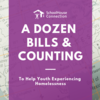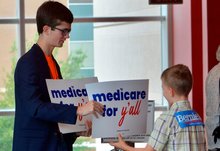0
News Article
Community:
Mar 5, 2019
If rent-control measures pass in all of the states and cities where they're currently on the table, nearly a third of all renter households in the United States could secure relief.
Authored by: Sophie Kasakove for Pacific Standard
Topics: Housing, Legislation & Policy
 Shared by Mica O'Brien
Shared by Mica O'Brien
Mica O'Brien posted a
on Mar 7, 2019
Sophie Kasakove for Pacific Standard
If rent-control measures pass in all of the states and cities where they're currently on the table, nearly a third of all renter households in the United States could secure relief.
0
News Article
Community:
Mar 5, 2019
Disasters are becoming more common in America. In the early and mid-20th century, fewer than 20 percent of U.S. counties experienced a disaster each year. Today, it's about 50 percent. According to the 2018 National Climate Assessment, climate change is already driving more severe droughts, floods and wildfires in the U.S. And those disasters are expensive. The federal government spends billions of dollars annually helping communities rebuild and prevent future damage. But an NPR investigation has found that across the country, white Americans and those with more wealth often receive more federal dollars after a disaster than do minorities and those with less wealth. Federal aid isn't necessarily allocated to those who need it most; it's allocated according to cost-benefit calculations meant to minimize taxpayer risk.
Authored by: Rebecca Hersher and Robert Benincasa for NPR
Topics: Community development, Funding, Housing, Legislation & Policy, Low-income, Racial inequalities, Research, Stability
 Shared by Mica O'Brien
Shared by Mica O'Brien
Mica O'Brien posted a
on Mar 7, 2019
Rebecca Hersher and Robert Benincasa for NPR
Disasters are becoming more common in America. In the early and mid-20th century, fewer than 20 percent of U.S. counties experienced a disaster each year. Today, it's about 50 percent.
0
News Article
Community:
Mar 5, 2019
In a recently published report called “A Roadmap to Reducing Child Poverty” from the National Academies of Sciences, Engineering and Medicine, its co-authors suggest policy changes that they claim could cut child poverty in half in just 10 years.
Authored by: Rhonda Fanning and Michael Marks for Texas Standard
Topics: Child welfare, Health, Legislation & Policy, Low-income
 Shared by Housing Is
Shared by Housing Is
Housing Is posted a
on Mar 7, 2019
Rhonda Fanning and Michael Marks for Texas Standard
In a recently published report called “A Roadmap to Reducing Child Poverty” from the National Academies of Sciences, Engineering and Medicine, its co-authors suggest policy changes that they claim could cut child poverty in half in just 10 years.
0
Publication
Community:
The California Homeless Youth Project (HYP) is a research and policy initiative that highlights the issues and challenges faced by unaccompanied young people who are homeless or lack stable housing. This website provides state and local policymakers and others with information and policy resources specific to unaccompanied homeless youth, with a focus on young people in California.
Authored by: CA.gov
Topics: Education, Homelessness, Housing, Legislation & Policy, Research, West Coast
 Shared by Housing Is
Shared by Housing Is
Housing Is posted a
on Mar 5, 2019
The California Homeless Youth Project (HYP) is a research and policy initiative that highlights the issues and challenges faced by unaccompanied young people who are homeless or lack stable housing.
0
News Article
Community:
Feb 22, 2019
The grants provided under Assembly Bill 4702 aim to help colleges address hunger statewide, leverage more sustainable solutions to address basic food needs on campus, raise awareness for available food services, and continue to build strategic partnerships at the local, state and national levels to address food insecurity among students.
Authored by: NJBiz
Topics: Education, Food insecurity, Funding, Legislation & Policy, Nutrition, Post-secondary, Youth
 Shared by Housing Is
Shared by Housing Is
Housing Is posted a
on Mar 4, 2019
The grants provided under Assembly Bill 4702 aim to help colleges address hunger statewide, leverage more sustainable solutions to address basic food needs on campus, raise awareness for available food services, and continue to build strategic partnerships at the local, state and national levels to
0
Interactive
Community:
Includes: The Strength of SNAP and SNAP Action Needed, The Emergency Food Assistance Program (TEFAP), Commodity Supplemental Food Program (CSFP), and Child Nutrition Reauthorization.
Authored by: Food Research & Action Center (FRAC)
Topics: Food insecurity, Funding, Legislation & Policy, Low-income, Nutrition
 Shared by Mica O'Brien
Shared by Mica O'Brien
Mica O'Brien posted a
on Mar 1, 2019
Food Research & Action Center (FRAC)
Includes: The Strength of SNAP and SNAP Action Needed, The Emergency Food Assistance Program (TEFAP), Commodity Supplemental Food Program (CSFP), and Child Nutrition Reauthorization.
0
Interactive
Community:
Restoring the value of the minimum wage — and helping families cover basic needs — is essential to addressing hunger. The federal minimum wage of $7.25 an hour has not increased since 2009. A more adequate minimum wage would foster the nation’s economic strength and growth to be shared in more equitable ways. Low-income workers and their families would benefit the most from a higher minimum wage, leading to reduced poverty, hunger, and income inequality.
Authored by: Food Research & Action Center (FRAC), the Economic Policy Institute, and the National Employment Law Project
Topics: Asset building, Legislation & Policy, Low-income
 Shared by Mica O'Brien
Shared by Mica O'Brien
Mica O'Brien posted a
on Mar 1, 2019
Food Research & Action Center (FRAC), the Economic Policy Institute, and the National Employment Law Project
Restoring the value of the minimum wage — and helping families cover basic needs — is essential to addressing hunger. The federal minimum wage of $7.25 an hour has not increased since 2009.
0
Interactive
Community:
Federal tax credits, like the EITC and refundable CTC, provide critical supports for millions of working women, children, and families every year. They supplement low wages and can help soften the financial impact of fluctuating incomes or job losses. These credits are especially important for communities of color and women.
Authored by: Food Research & Action Center (FRAC)
Topics: Child welfare, Legislation & Policy, Low-income, Research
 Shared by Mica O'Brien
Shared by Mica O'Brien
Mica O'Brien posted a
on Mar 1, 2019
Food Research & Action Center (FRAC)
Federal tax credits, like the EITC and refundable CTC, provide critical supports for millions of working women, children, and families every year. They supplement low wages and can help soften the financial impact of fluctuating incomes or job losses.
0
Publication
Community:
Feb 28, 2019
In light of the many costs generated by child poverty for the United States, a new report from the National Academies of Sciences, Engineering, and Medicine provides evidence-based policy and program packages that could cut the child poverty rate by as much as 50 percent while at the same time increasing employment and earnings among adults living in low-income families.
Authored by: The National Academies of Sciences, Engineering, and Medicine
Topics: Child welfare, Legislation & Policy, Low-income, Research
 Shared by Mica O'Brien
Shared by Mica O'Brien
Mica O'Brien posted a
on Mar 1, 2019
The National Academies of Sciences, Engineering, and Medicine
In light of the many costs generated by child poverty for the United States, a new report from the National Academies of Sciences, Engineering, and Medicine provides evidence-based policy and program packages that could cut the child poverty rate by as much as 50 percent while at the same time incre
0
Report
Community:
The strengths and abilities children develop from infancy through adolescence are crucial for their physical, emotional, and cognitive growth, which in turn help them to achieve success in school and to become responsible, economically self-sufficient, and healthy adults. Capable, responsible, and healthy adults are clearly the foundation of a well-functioning and prosperous society, yet America’s future is not as secure as it could be because millions of American children live in families with incomes below the poverty line. A wealth of evidence suggests that a lack of adequate economic resources for families with children compromises these children’s ability to grow and achieve adult success, hurting them and the broader society.
Authored by: National Academies of Sciences, Engineering, and Medicine
Topics: Child welfare, Dual-generation, Legislation & Policy, Low-income, Research
 Shared by Housing Is
Shared by Housing Is
Housing Is posted a
on Mar 1, 2019
National Academies of Sciences, Engineering, and Medicine
The strengths and abilities children develop from infancy through adolescence are crucial for their physical, emotional, and cognitive growth, which in turn help them to achieve success in school and to become responsible, economically self-sufficient, and healthy adults.
0
Report
Community:
The monthly benefits provided by SNAP enhance the food purchasing power of eligible low-income individuals and families. However, as described by many studies, including one by the Institute of Medicine, the greatest shortcoming of SNAP is that benefits for most households are not enough to get through the entire month without hunger or being forced to sacrifice nutrition quality. This limitation persists even in the face of overwhelming evidence on the gains from more adequate monthly SNAP benefits.This paper analyzes why SNAP benefits are inadequate, reviews the body of research showing positive effects from more adequate SNAP benefits, and concludes with some of the key policy solutions that can improve benefit adequacy.
Authored by: Food Research & Action Center (FRAC)
Topics: Food insecurity, Legislation & Policy, Low-income, Nutrition, Research
 Shared by Housing Is
Shared by Housing Is
Housing Is posted a
on Mar 1, 2019
Food Research & Action Center (FRAC)
The monthly benefits provided by SNAP enhance the food purchasing power of eligible low-income individuals and families.
0
Publication
Community:
Feb 25, 2019
The 2019 state legislative season is in full swing, and SchoolHouse Connection is hard at work on 12 bills in 7 states (IN, KY, ME, NV, TN, TX, UT). We’re also supporting legislative advocates in 4 additional states (AZ, CA, MD, WA), and anticipate additional bills to be filed in LA, MO, NJ, and NC.
Authored by: SchoolHouse Connection
Topics: Child welfare, Education, Funding, Homelessness, Housing, Legislation & Policy, Low-income, Youth
 Shared by Housing Is
Shared by Housing Is
Housing Is posted a
on Feb 28, 2019
The 2019 state legislative season is in full swing, and SchoolHouse Connection is hard at work on 12 bills in 7 states (IN, KY, ME, NV, TN, TX, UT). We’re also supporting legislative advocates in 4 additional states (AZ, CA, MD, WA), and anticipate additional bills to be filed in LA, MO, NJ, and NC.
0
News Article
Community:
Feb 28, 2019
The city says it plans to move ahead with a costly, stopgap renovation of a New Orleans jail building to house dozens of inmates with mental health issues — but it also wants to keep its options open.
Authored by: Matt Sledge for the New Orleans Advocate
Topics: Criminal justice, Housing, Legislation & Policy, Low-income, Mental health, South, Supportive housing
 Shared by Housing Is
Shared by Housing Is
Housing Is posted a
on Feb 28, 2019
Matt Sledge for the New Orleans Advocate
The city says it plans to move ahead with a costly, stopgap renovation of a New Orleans jail building to house dozens of inmates with mental health issues — but it also wants to keep its options open.
0
News Article
Community:
Feb 23, 2019
Gerrymandered school boundaries and greater transportation costs are the trade-off school districts must make in order to achieve racial integration and close the racial achievement gap, said a researcher from the Urban Institute.
Authored by: Roger McKinney for Columbia Daily Tribune
Topics: Child welfare, Education, Legislation & Policy, Racial inequalities, Research, Transportation
 Shared by Housing Is
Shared by Housing Is
Housing Is posted a
on Feb 28, 2019
Roger McKinney for Columbia Daily Tribune
Gerrymandered school boundaries and greater transportation costs are the trade-off school districts must make in order to achieve racial integration and close the racial achievement gap, said a researcher from the Urban Institute.
0
Publication
Community:
Feb 27, 2019
Over the past two decades, criminal justice reform has focused on evidence-based interventions to prevent arrests and incarceration and to facilitate community reintegration. These initiatives represent a movement toward a less punitive, more holistic approach to public safety, targeting critical social factors that lead to and perpetuate criminal justice involvement. Because housing problems are often a key underlying factor for people’s involvement with the criminal justice system, there are ways housing interventions can help lessen criminal justice involvement. Decriminalizing homelessness, for example, can reduce rates of initial arrest and incarceration, especially for people with low-level, nonviolent offenses. A sufficient supply of affordable housing and supportive services could help people stabilize after their release from jail and reduce the likelihood of recidivism. Policymakers, advocates, and practitioners in housing and criminal justice systems can partner to promote and evaluate housing strategies that divert people from the criminal justice system.
Authored by: Kimberly Burrowes for How Housing Matters (Urban Institute)
Topics: Criminal justice, Homelessness, Housing, Legislation & Policy, Low-income, Research, Stability
 Shared by Mica O'Brien
Shared by Mica O'Brien
Mica O'Brien posted a
on Feb 28, 2019
Kimberly Burrowes for How Housing Matters (Urban Institute)
Over the past two decades, criminal justice reform has focused on evidence-based interventions to prevent arrests and incarceration and to facilitate community reintegration.
0
Report
Community:
Welcome to the Food Research & Action Center’s winter issue of ResearchWire. This quarterly newsletter focuses on the latest research, reports, and resources from government agencies, academic researchers, think tanks, and elsewhere at the intersection of food insecurity, poverty, the federal nutrition programs, and health.
Authored by: Food Research & Action Center (FRAC)
Topics: Child welfare, Food insecurity, Funding, Health, Legislation & Policy, Low-income, Nutrition, Research, Youth
 Shared by Mica O'Brien
Shared by Mica O'Brien
Mica O'Brien posted a
on Feb 28, 2019
Food Research & Action Center (FRAC)
Welcome to the Food Research & Action Center’s winter issue of ResearchWire.
0
News Article
Community:
Jan 30, 2019
The gas tax hasn’t budged since 1992, and highway trust fund is running on fumes. Could a Green New Deal pushed by Congress be a fix?
Authored by: Laura Bliss for CityLab
Topics: Community development, Funding, Housing, Legislation & Policy, Transportation
 Shared by Mica O'Brien
Shared by Mica O'Brien
Mica O'Brien posted a
on Feb 28, 2019
The gas tax hasn’t budged since 1992, and highway trust fund is running on fumes. Could a Green New Deal pushed by Congress be a fix?
0
Publication
Community:
Feb 15, 2019
Despite that consensus, the digital divide is about to get worse, and current policies will exacerbate it. We need to replace those policies with a coordinated approach that provides appropriate incentives for all stakeholders to bridge widening gaps.
Authored by: Blair Levin for The Brookings Institution
Topics: Broadband, Legislation & Policy, Low-income, Racial inequalities
 Shared by Mica O'Brien
Shared by Mica O'Brien
Mica O'Brien posted a
on Feb 28, 2019
Blair Levin for The Brookings Institution
Despite that consensus, the digital divide is about to get worse, and current policies will exacerbate it. We need to replace those policies with a coordinated approach that provides appropriate incentives for all stakeholders to bridge widening gaps.
0
Publication
Community:
Feb 22, 2019
The development of new digital telecommunications capabilities combined with a persistent digital divide leaves the public sector with enormous responsibilities to promote network quality and deliver equitable access—but it can only do so by sensibly splitting regulatory responsibilities between the national and local levels. Unfortunately, news out of Washington, D.C. reveals the federal government has overstepped its appropriate role, constricting local governments’ abilities to craft locally tailored solutions.
Authored by: Blair Levin for The Brookings Institution
Topics: Broadband, Community development, Legislation & Policy, Low-income
 Shared by Mica O'Brien
Shared by Mica O'Brien
Mica O'Brien posted a
on Feb 28, 2019
Blair Levin for The Brookings Institution
The development of new digital telecommunications capabilities combined with a persistent digital divide leaves the public sector with enormous responsibilities to promote network quality and deliver equitable access—but it can only do so by sensibly splitting regulatory responsibilities between the
0
Publication
Community:
Feb 19, 2019
So, are the stars better aligned for an infrastructure bill this year? Unfortunately, rhetoric only goes so far, and Washington continues to suffer from the same elemental failure as it did in 2017—the U.S. lacks a clear infrastructure vision. Only when Congress is ready to truly debate what objectives the federal government hopes to achieve—and how to invest to advance those goals—can we begin to craft a transformative national strategy.
Authored by: Adie Tomer and Joseph Kane for The Brookings Institution
Topics: Community development, Funding, Housing, Legislation & Policy, Transportation
 Shared by Housing Is
Shared by Housing Is
Housing Is posted a
on Feb 28, 2019
Adie Tomer and Joseph Kane for The Brookings Institution
So, are the stars better aligned for an infrastructure bill this year? Unfortunately, rhetoric only goes so far, and Washington continues to suffer from the same elemental failure as it did in 2017—the U.S. lacks a clear infrastructure vision.
0
Publication
Community:
We can imagine a future where everyone can find and afford a quality home. Where every neighborhood offers a diversity of housing options. And where people up and down the income ladder can enjoy housing security and build wealth through ownership. Achieving this vision requires more than incremental tinkering with today’s market institutions and public policies. It requires bold innovation by changemakers at all levels of government and in the private and nonprofit sectors.
Authored by: Urban Institute
Topics: Housing, Legislation & Policy, Mobility, Racial inequalities, Research
 Shared by Housing Is
Shared by Housing Is
Housing Is posted a
on Feb 21, 2019
We can imagine a future where everyone can find and afford a quality home. Where every neighborhood offers a diversity of housing options. And where people up and down the income ladder can enjoy housing security and build wealth through ownership.
0
News Article
Community:
Feb 19, 2019
New Orleans faced a major crisis in homelessness following Hurricane Katrina. In 2007, two years after the storm, there were more than 11,600 homeless people in the city. Since then, New Orleans stepped up its effort to tackle homelessness and has brought that number down 90 percent.
Authored by: Jeremy Hobson for WBUR
Topics: Homelessness, Housing, Legislation & Policy, Partnerships, South
 Shared by Housing Is
Shared by Housing Is
Housing Is posted a
on Feb 21, 2019
New Orleans faced a major crisis in homelessness following Hurricane Katrina. In 2007, two years after the storm, there were more than 11,600 homeless people in the city. Since then, New Orleans stepped up its effort to tackle homelessness and has brought that number down 90 percent.
0
Research
Community:
Feb 20, 2019
As the US Department of Housing and Urban Development (HUD) prioritizes programs to help households receiving rental assistance achieve economic self-sufficiency, researchers, policymakers, and advocates debate the utility of work requirements as an effective pathway toward economic self-sufficiency and the risks of offering rental assistance on a conditional basis. This study contributes additional evidence suggesting that work requirements, when implemented gradually and in context with hardship exemptions and local supports, can boost annual household income, earnings, and the adult-employment ratio* for low-income households with no work history. But work requirements have little effect on those with prior earnings.
Authored by: Han Bum Lee and Paul E. McNamara for Housing Policy Debate (How Housing Matters, Urban Institute)
Topics: Asset building, Housing, Legislation & Policy, Low-income, Research, Workforce development
 Shared by Housing Is
Shared by Housing Is
Housing Is posted a
on Feb 21, 2019
Han Bum Lee and Paul E. McNamara for Housing Policy Debate (How Housing Matters, Urban Institute)
As the US Department of Housing and Urban Development (HUD) prioritizes programs to help households receiving rental assistance achieve economic self-sufficiency, researchers, policymakers, and advocates debate the utility of work requirements as an effective pathway toward economic self-sufficiency
0
Policy Brief
Community:
This annotated resource compilation is intended to help state and local agencies access information and resources needed to better understand the federal legal protections and requirements associated with datasets collected by federal agencies or as part of a federally funded program.
Authored by: The Network for Public Health Law
Topics: Data sharing, Disabilities, Early childhood, Education, Health, Homelessness, Legislation & Policy, Post-secondary
 Shared by Mica O'Brien
Shared by Mica O'Brien
Mica O'Brien posted a
on Feb 20, 2019
The Network for Public Health Law
This annotated resource compilation is intended to help state and local agencies access information and resources needed to better understand the federal legal protections and requirements associated with datasets collected by federal agencies or as part of a federally funded program.
0
News Article
Community:
Feb 19, 2019
A glossary for the emerging Democratic health care debate.
Authored by: Margot Sanger-Katz for The New York Times
Topics: Health, Legislation & Policy, Low-income, Medicaid / Medicare, Seniors
 Shared by Mica O'Brien
Shared by Mica O'Brien
Mica O'Brien posted a
on Feb 19, 2019
Margot Sanger-Katz for The New York Times
A glossary for the emerging Democratic health care debate.



 Shared by Housing Is
on Mar 7, 2019
Shared by Housing Is
on Mar 7, 2019

 Shared by Housing Is
on Mar 5, 2019
Shared by Housing Is
on Mar 5, 2019
 Shared by Housing Is
on Mar 4, 2019
Shared by Housing Is
on Mar 4, 2019
 Shared by Housing Is
on Mar 1, 2019
Shared by Housing Is
on Mar 1, 2019
 Shared by Housing Is
on Mar 1, 2019
Shared by Housing Is
on Mar 1, 2019

 Shared by Housing Is
on Feb 28, 2019
Shared by Housing Is
on Feb 28, 2019


 Shared by Housing Is
on Feb 28, 2019
Shared by Housing Is
on Feb 28, 2019

 Shared by Housing Is
on Feb 28, 2019
Shared by Housing Is
on Feb 28, 2019


 Shared by Housing Is
on Feb 28, 2019
Shared by Housing Is
on Feb 28, 2019
 Shared by Housing Is
on Feb 21, 2019
Shared by Housing Is
on Feb 21, 2019
 Shared by Housing Is
on Feb 21, 2019
Shared by Housing Is
on Feb 21, 2019
 Shared by Housing Is
on Feb 21, 2019
Shared by Housing Is
on Feb 21, 2019





